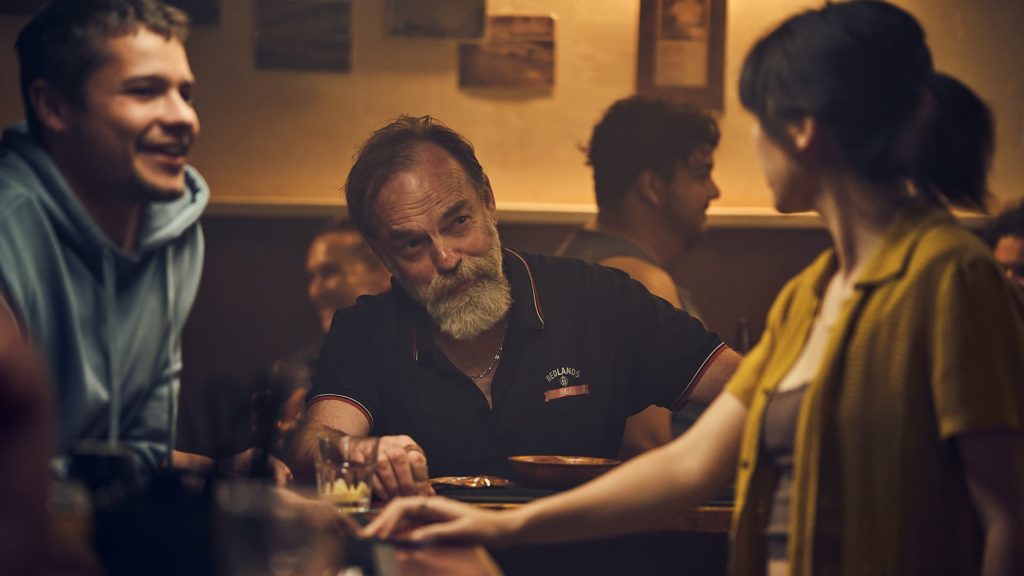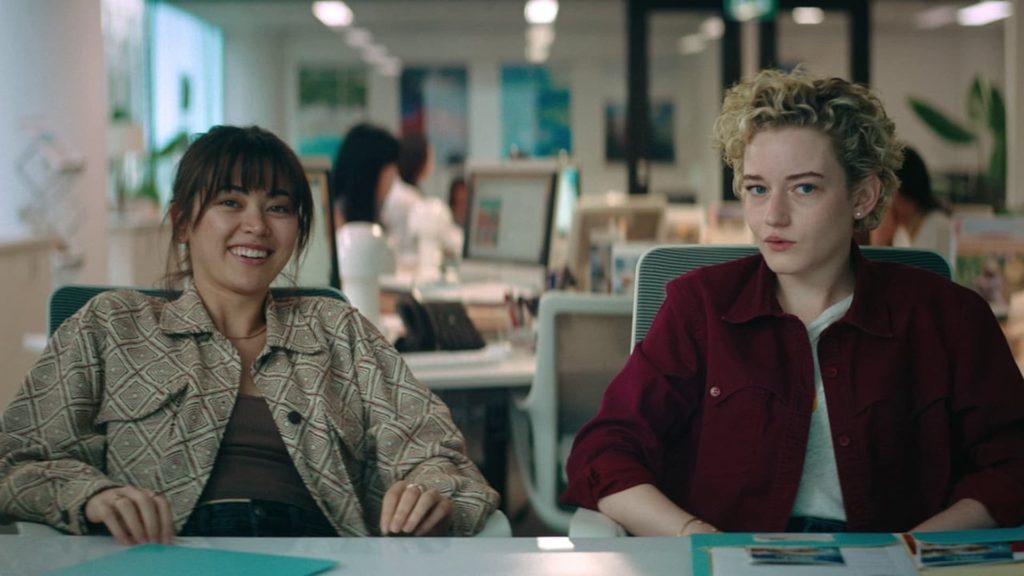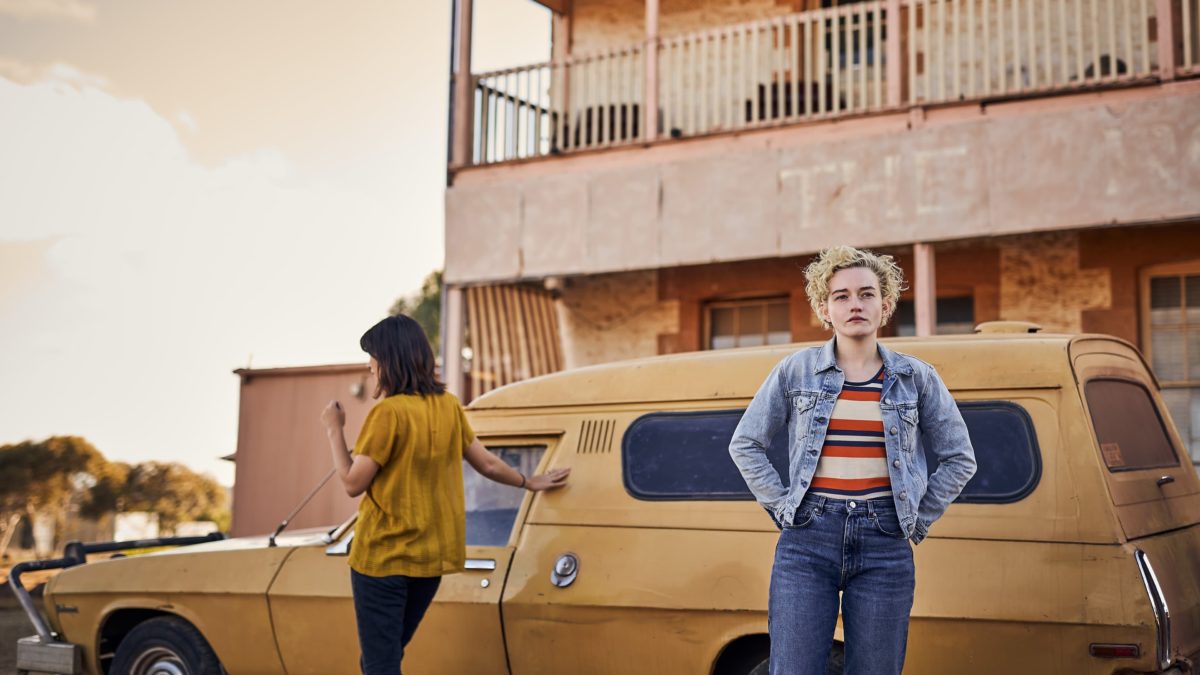Outback fake out
It’s basically impossible to talk about The Royal Hotel, even defining its genre, without getting into spoilers. And I don’t mean this in a From Dusk Till Dawn your-mind-will-be-blown sort of way; in fact, the opposite. But proceed accordingly.
The Royal Hotel is such a tonally and narratively unusual film. It’s no-thrills thriller. It’s Texas Chainsaw Massacre in Australia, but the murderers are instead rude bar patrons who get chased off before they cause any real trouble. The tension builds and builds, an actual “incident” constantly on the verge of happening, only for each potential act — violence, abduction, etc. — to get diverted in a reasonable manner. And then the movie is over (with just one head-scratching twist in the finale). This is, in other words, the gritty drama version of a hangout comedy.
This is the type of film I’d call “well-observed,” which is to say it’s a good film but kinda pointless. It is solidly-written and very well-acted. It features a nice production and Outback flavor. Director and co-writer Kitty Green (of The Assistant fame) builds a terrific ebb and flow to the suspense. Yet I can’t really make a strong argument for recommending it to most people: It’s not just that “nothing happens” (I’m a well-advertised lover of low-plot jams) but that constant tease of something happening makes it feel a bit of a letdown.

The film follows Hanna (Julia Garner) and Liv (Jessica Henwick), a pair of twentysomethings in the midst of a grand backpacking trip in Australia. Their cash reserves run low and they get jobs as bartenders at a joint called The Royal Hotel (its name very ironic for a dusty, drab building). It’s the social hub of a tiny, backwards-ass little mining village, and one of the film’s objectives is to deconstruct “small town charm” into “small-mindedness.”
As Hanna and Liv get their bearings, the stark blend of boringness and isolation reveals its impact both on themselves and the townspeople. Alcoholism is rampant. Drink-slingers like Liv and Hanna are expected to be flirty live entertainment who don’t mind patrons grabbing their asses. The bar owner is in a constant drunken stupor, and it’s not even clear he can pay the bills.
The longer the duo hang around, the more Hanna and Liv’s viewpoints diverge, and this is when the movie really starts to shine. Hanna finds the entire scene dehumanizing and abhorrent, drawing a much harder line on assholery than Liv, who is swept into the debauchery and “fun.”
Around this time, the movie shifts its perspective more tightly to Hanna’s viewpoint, infusing each incident with an insidious danger that threatens to break out into real violence. It’s not always clear how much of this is just Hanna’s subjective viewpoint, and how much of it is authentic danger. In some ways, it reminded me of the excellent opening act of Barbarian of last year in the way it weaponizes the wary female perspective to suspenseful effect.

But, as stated earlier, the incident Hanna fears never really occurs despite some close calls. And yet it’s not really a case of the movie “pulling its punches” nor an implication that Hanna is suffering from paranoia. It’s more of a “ain’t life messy, but not always narratively fulfilling” story design, which simply feels off for this specific film.
The closing five minutes include a totally-misguided “yass queen” act of triumphal feminism that obliterates whatever subdued ambivalence the film has constructed to that point. I know it’s a bit ironic that my chief complaint (or, if not complaint, furrowed-brow-observation) of the film is that there’s not enough actual incident in it; and then I turn around and complain about the one thing that actually happens at the end. But it really does torpedo what the film has built to that point.
I want to stress, one more time, that much of the construction of this film is outstanding. I especially like Garner’s turn as Hanna; it’s a deeply interior performance that draws us into her growing discomfort at her surroundings. (If the year’s releases stopped today, it would be in my top 5 lead actress performances of the year.) It is a much better turn than Henwick’s flat, opaque take on Liv. I do wonder if the drastically different natures of the performances are part of Green’s choice to gradually shift the perspective towards Hanna and away from Liv as the movie proceeds; but Occam’s razor would suggest one is an actor delivering an excellent performance and one isn’t.
Ultimately, The Royal Hotel is a bit too dry for me to give it a recommendation to anyone except those movie fans who really enjoy human drama irrespective of meaningful payoff. But if you like your cinema “well-observed,” it’s worth a spin.
Is It Good?
Good (5/8)
Dan is the founder and head critic of The Goods. Follow Dan on Letterboxd. Join the Discord for updates and discussion.

